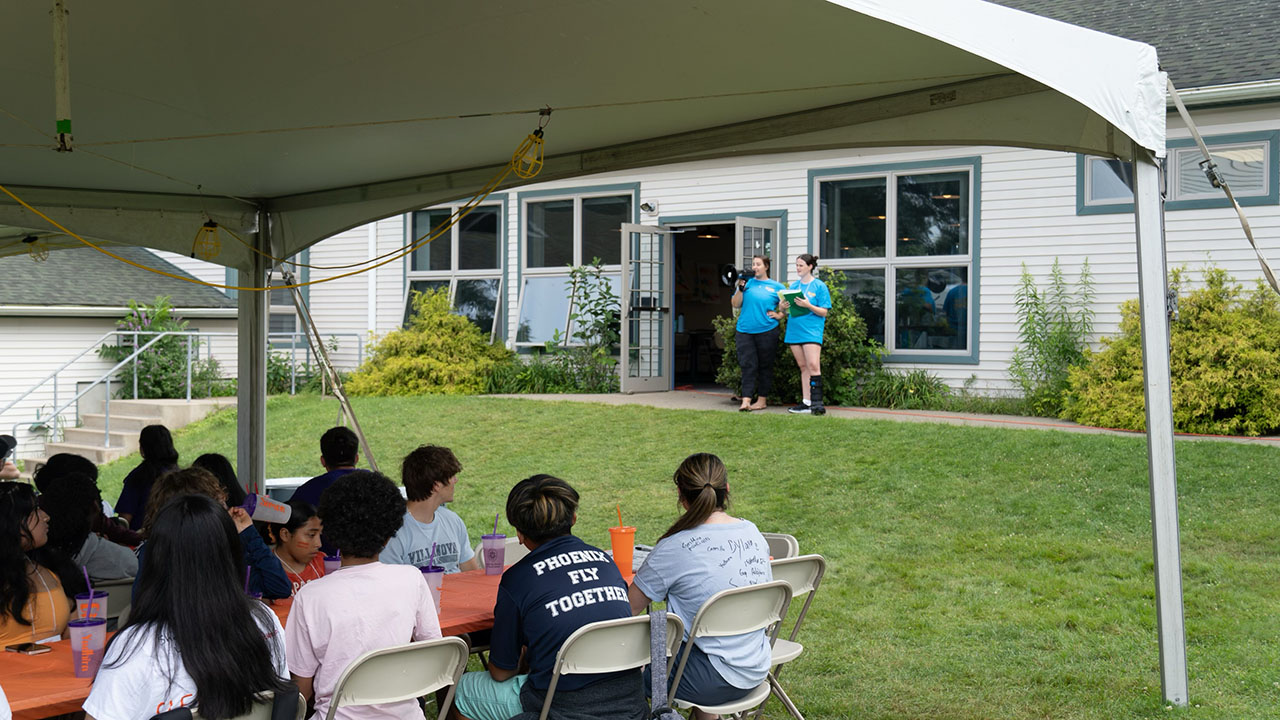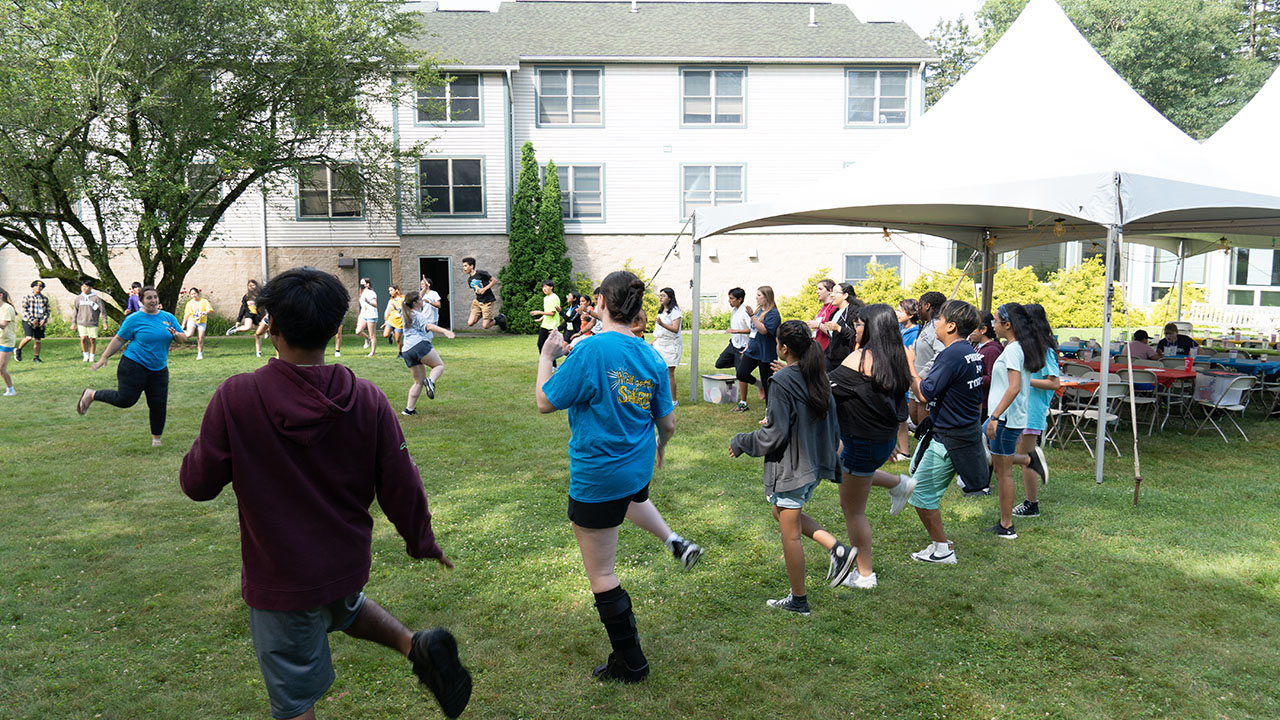Summer Spotlight: SPARK Program

By: Robert Correas-Rivera ’24, student correspondent
Brooke McNabola '24, a kinesiology major from Wallingford, Connecticut and Ella Rokke '24, a nursing major from West Chester, Pennsylvania were among the leaders of the SPARK program, which is designed to support at-risk youth between the ages of 12-15. The program is held over the course of one week at The University of Scranton Chapman Lake Retreat Center. Sponsors include: The Scranton Area Foundation and The Women in Philanthropy initiative.
Here, they leaders discuss their experiences.
What are the goals of the SPARK program?
Brooke: "The goal of SPARK is for children who participate to feel welcomed, loved, and heard no matter what their situations are. The children who participate in the program are an at risk youth population who often deal with hardships including poverty, hard home lives, or discrimination due to their ethnicity. Our team of 10 University of Scranton students and 8 Scranton Preparatory students work together to create activities to ensure the children gain knowledge about self-love, self-worth, inner and outer image, bullying and peer pressure and healthy lifestyle while having fun."
Ella: "Father Greg Boyle once said, 'My job isn't to fix or rescue or to save. It's to accompany, see people, listen to them.' To me, this quote captures the entire goal of the SPARK program, to be one with each of these kids, to see them for who they are, to listen to them, to help them develop the tools necessary for young adulthood and to remind them of how worthy of love each one of them is."
Who took part in the SPARK program?
Brooke: "The population that we work with is 12-15 year olds who are at-risk youth. Specifically, we work with the 7th and 8th grade of the Nativity Miguel school. This school is a yearlong education, so the week of SPARK is typically their summer vacation."
Ella: "This year, I and my co-team leader, Brooke McNabola, and our aide, Laura Echausse, were lucky enough to be a part of the SPARK program once again. Led by Avianna Carilli (coordinator of domestic and international service programs at The University of Scranton), Pat Vaccaro (director of the University’s Center for Service and Social Justice) and Kathy Elgaway (campus minister at Scranton Preparatory School), we welcomed 46 kids, ages 12 to 15. Brooke and I led our ten peers through a similar process that we went experienced as team members last year. The team this year consisted of: Aidan Guarnuccio, Chris Gutt, Gigi Baquerizo, Kathleen Appau, Shervin Mohktari, Zachary Morrison, Abby Casal, Sophia Pisarski, Olivia Miller, and Patrick George. We also had three volunteers, Francesca Congelosi, Liam Holden and Quinn Holden. Alongside our University team, we were lucky to partner with eight Scranton Prep students, Aidan Busacco, Shel-Andra Dunkley, Jack Krowiak, Michael Lloyd, Tyler Mackrell, Elijah Normil, Isaiah Persico and Gavin Walsh.
What do you think is the community impact of running a program like this?
Brooke: "The community impact that this program has is enormous. At the beginning of the week, the kids participating do not want to open up, have a hard time talking in activities and never want to admit that they are having fun. However, as the week goes on, their attitudes towards SPARK change remarkably. On Friday, many of the kids tell their team leaders how much their lives have been changed, how they never want to leave and that they want to come back to SPARK every year. The community that is created between the SPARK team and kids as well as The University of Scranton and Scranton Preparatory school is extraordinary."
Ella: "SPARK focuses on important and influential topics such as self-worth, healthy communication and lifestyle, inner and outer image, managing stress and mental health and bullying. Forty-six children left SPARK impacted by what they learned and who they met. This is where the community impact stems from, their newfound confidence to set forth into their home lives, school lives and eventually the world, with new tools to handle adversity. They learn that they are not defined by their circumstances, and leave empowered to share themselves and their gifts with the world, regardless of their current circumstances.
On the other side, teaching these topics also serves as a continued reminder to ourselves that we, too, have gifts worth sharing, that we can grow through giving to others and that we are not defined by our individual circumstances. Through loving these kids unconditionally, we at The University of Scranton and Scranton Prep feel that unconditional love right back, and are able to give it to the community.
What was your favorite part of the week?
Brooke: "My favorite part of the week happened on Wednesday, which is the middle of the week for the kids. On Wednesday, the kids go whitewater rafting. To the majority of the kids, this is a once-in-a-lifetime experience. They are all so grateful for this experience, and getting to watch the pure joy on their face was life changing."
Ella: "It is hard to pinpoint a favorite part of such an incredible week, but watching the team create bonds with the kids so quickly and effortlessly provided me with such genuine joy and pride."
How does this program connect to the university's Jesuit ideals?
Brooke: "This program connects with the Jesuit ideal of Magis. Magis is doing more for others. Throughout this week, our team does everything in their power to do more, be more, and want more for the kids that come to SPARK. We want the absolute best for each one of these kids and if we are able to give them an extra ounce of our attention, support, and most importantly love, we do that with no questions asked."
Ella: "Jesuit founder St. Ignatius Loyola once said, 'Go forth and set the world on fire.' In many ways, the SPARK program prepares children and leaders, alike, to do just that. With a SPARK lit in each of them, they leave the week ready to set the world on fire with passion, zeal, and love.
Cura personalis, or “care for the person," is greatly reflected in the mission of the SPARK program. Cura personalis encourages care, concern and attentiveness to the personal development of each individual. SPARK fosters an environment dedicated to promoting respect, love, and care for the whole person.
Lastly, Magis, the idea of doing more for the greater good of God, and therefore, also doing more for others. Magis encourages us to strive for more, to live in a spirit of giving and standing with and for those around us. This is what the SPARK program is all about, to do more, be more, to love more, for the greater good." 
Brooke McNabola '24, shown at left, a kinesiology major from Wallingford, Connecticut and Ella Rokke '24, at right, a nursing major from West Chester, Pennsylvania were among the leaders of the SPARK program, which is designed to support at-risk youth between the ages of 12-15.






